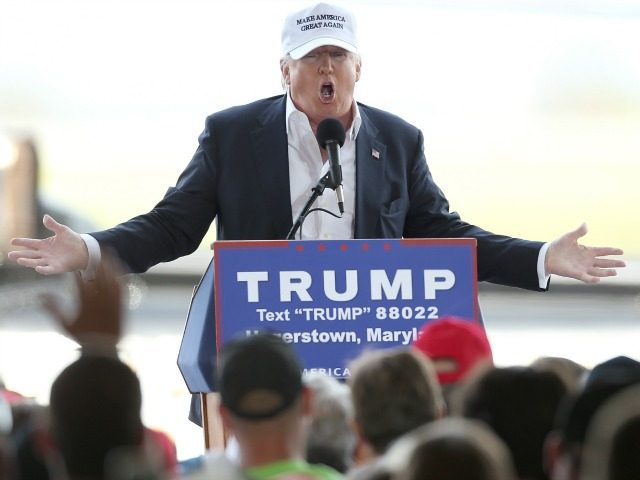Coming off a landslide win in his home state primary last week, Donald Trump is set to sweep five Northeastern states voting in primaries on Tuesday.
With the expected run of the tables, Trump is likely to net at least 85 delegates, inching him closer to the 1,237 delegates he needs to secure the nomination on the first ballot.
The latest polls show Trump with large double-digit leads in Connecticut, Delaware, Maryland, Pennsylvania and Rhode Island ahead of Tuesday’s vote. Trump largely has dominated the Northeast region during the primary season. Trump’s nearest challenger nationally, Sen. Ted Cruz, has struggled to replicate his success in other parts of the country in this area. It is home to far fewer of the “very conservative” and “evangelical” voters who have been the foundation of Cruz’s support.
As a result, Trump will win an large majority of the 172 delegates awarded on Tuesday. He would be poised to win an overwhelming majority, but for the difficulty of determining a clear winner from Pennsylvania’s delegate selection process.
Delaware: The state awards its 16 delegates to the winner of the statewide vote. The winner only has to have the most votes to sweep all of the delegates; there is not majority vote threshold. Trump will win the state and all of its delegates.
Connecticut: The state awards a total of 28 delegates. If a candidate wins the statewide vote with 50 percent, that candidate wins all 13 at-large delegates. If a candidate wins, but falls short of the 50 percent threshold, the delegates are awarded proportionally. The most recent polls show Trump right at or above the 50 percent threshold. He will likely win all 13 delegates.
Another 15 delegates are awarded to the winner of each of the state’s 5 congressional districts. The winning candidate in each district receives 3 delegates. Based on his large lead in the state, Trump is likely to win at least 3 of the state’s districts. This would net him an additional 9 delegates, at a minimum.
Maryland: The state awards 38 delegates, with the winner of the statewide vote receiving 14 and another 24 awarded to the winners of the state’s 8 congressional districts. Trump is the clear leader in 3 of these districts, with either Kasich or Cruz competitive in the other districts.
Trump should win at least 3 of these districts, but he could easily capture a few more or even sweep the state. Trump will net at least 23 of the state’s 38 delegates.
Pennsylvania: The Keystone State awards 71 delegates on Tuesday, the largest single prize of the states voting. The winner of the statewide vote receives 17 delegates. The other 54 delegates are awarded through the state’s 18 congressional districts. Delegates in these districts are elected directly by the voters, i.e. the delegate candidates’ names are on the ballot. No campaign or candidate affiliation, however, is listed with the candidate’s name.
Pennsylvania’s 54 congressional district candidates are unbound at the convention. Even on the first ballot, these delegates are free to support the candidate of their choosing, regardless of which candidate carries their district. This makes it almost impossible to assign delegates to a candidate ahead of the convention. Even if a delegate publicly announces how they intend to vote at the convention, they are not legally bound by this decision.
Trump will easily win the statewide vote in Pennsylvania, netting his campaign the 17 statewide delegates. He will likely also win some number of congressional district delegates, but it is impossible to clearly discern that number. As a result, Trump will collect at least 17 delegates and likely a couple dozen additional delegates.
Rhode Island: The Ocean State awards its 19 delegates proportionally. The most recent polls show Trump with 49 percent, followed by Kasich at 24 and Cruz at 14 percent. Thirteen delegates are awarded based on the share of the vote in the state, while another 6 are awarded through the results in the state’s two congressional districts.
The proportional rules in the congressional districts are such that all three candidates will receive one delegate in each district.
Based on current polling, Trump would net 9 delegates in the state, while Cruz and Kasich would receive 6 delegates and Cruz 4.
In total, Trump will net at least 85 pledged or bound delegates from Tuesday’s contests. He will win additional delegates from Pennsylvania, but these won’t be legally bound to him.
The primaries on Tuesday will cap a two-week sweep of primary contests for the Trump campaign. It has been a vital, geographic boost to the frontrunner’s campaign after his loss in Wisconsin at the beginning of the month. The primary contests now shift to the Midwest, Plains and West coast where his challengers have proven more competitive.
While Trump inches much closer to the nomination as the month closes, he isn’t yet assured of winning the minimum 1,237 delegates he needs to clinch it on the first ballot. He is heading into these final contests with a great deal of momentum, however. If Cruz and Kasich are going to block Trump from securing the nomination ahead of the RNC convention, their time is running out.

COMMENTS
Please let us know if you're having issues with commenting.